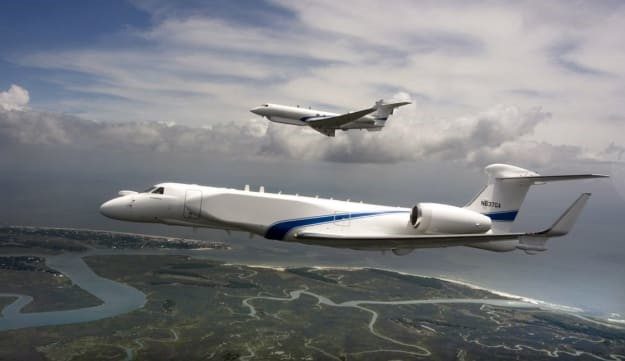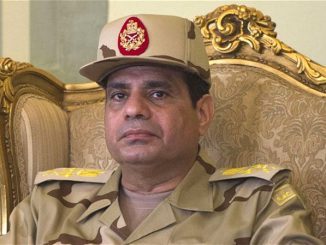
Two business jets, an offshore company, millions in cash, wealthy Gulf royals, one Israeli businessman – and Iran. Leaked documents reveal the secrets behind the United Arab Emirates’ newest spy planes, reports Haaretz.
For the past few weeks an innocent-looking white executive jet has been taking off from the Al Dhafra Air Base in Abu Dhabi, cruising for hours in the airspace above the Persian Gulf. A much closer look is needed to notice the unique protrusions on its belly, tail and back. This is not an ordinary executive jet, but an advanced surveillance aircraft owned by the United Arab Emirates, whose purpose is to gather electronic intelligence – and one of its targets is Iran.
The sight of the surveillance plane that recently began trial flights marks the last stages of a secret mega deal that began about a decade ago, and whose connection to Israel was unknown until now. A Haaretz investigation reveals that the person behind the supply of the planes is Israeli businessman and entrepreneur Matanya “Mati” Kochavi.
Documents obtained by Haaretz, some of them originating in the huge Paradise Papers leak by the International Consortium of Investigative Journalists (ICIJ) and the German newspaper Sueddeutsche Zeitung in 2017, reveal that the deal involved total payments of about 3 billion shekels ($846 million according to the current exchange rate). The documents note that at least part of this sum was paid for in cash, and they name UAE leaders as being connected to one of the companies involved in the transaction.
The fact that there are no diplomatic ties between Israel and the UAE and other Persian Gulf countries has not prevented the shared interests of the countries in the region to forge an extensive unofficial relationship, including in business, military and political spheres. In the case of Israel and the Gulf states, one main shared interest is their mutual enemy: Iran.
According to a report in The Wall Street Journal this year, Israel, Saudi Arabia and the UAE regularly exchange intelligence about threats from Iran. A study published last August by the Tony Blair Institute for Global Change estimates that Israel conducts trade with the Gulf states to a tune of $1 billion annually. And if in the past the Palestinian problem made it difficult to develop these ties, today it is almost a non-issue.
In an interview with the British newspaper The Guardian in March, Jamal al-Suwaidi, founder of the Emirates Center for Strategic Studies and Research, confirmed that, as opposed to the past, the Palestinian issue is no longer at the top of the agenda in the Gulf states.

The original Israeli army contract for purchasing the spy planes
“The Palestinian cause is no longer at the forefront of Arabs’ interests, as it used to be for long decades,” he said. “It has sharply lost priority in light of the challenges, threats and problems that face countries of the region.”
Suwaidi added that the question of maintaining ties with Israel was not comparable to the “threats posed … by Iran, Hezbollah and terrorist groups.”
Dr. Theodore Karasik, a Fellow on Russian and Middle Eastern Affairs at the Washington, D.C.-based Jamestown Foundation, lived in the UAE and is familiar with the country’s defense industry. In a phone interview, Karasik explains that the reason for the Emirates’ investment in surveillance planes stems from a desire to develop the capability to gather intelligence independently. While the United States gathers such information in the region, it does not necessarily share all of it with the UAE, says Karasik. The need for information concerning, Libya, Yemen and Iran is what has led the Emirates to invest huge sums in the acquisition of reconnaissance aircraft, he notes.
Over the years many air forces in the world have used wide-bodied jets to gather electronic information. But in the past two decades there has been a move to much smaller executive jets that have been adapted for monitoring, intelligence and electronic warfare. Along their length or in their belly, these aircraft are equipped with modern radar mechanisms, antenna arrays, advanced sensors and other information-gathering systems.
In Israel, for example, the air force established the Nachshon Squadron, composed of Gulfstream 5 business jets that were adapted for airborne warning and military air traffic control, and intelligence-gathering. Israel Aerospace Industries has adapted additional Gulfstream planes for Italy and Singapore. Great Britain’s Royal Air Force, for example, established the Raytheon Sentinel squadron for surveillance purposes, using Bombardier Global Express long-range business jets that were adapted by Raytheon to meet the RAF’s requirements.
UAE as ‘end user’
An examination by Haaretz of hundreds of documents and email correspondence leaked from the Appleby law firm, in what became known as the Paradise Papers, reveals that the UAE’s military wanted to create a similar apparatus for surveillance aircraft, and the deal began to coalesce about a decade ago. The papers describe the complex structure established for acquiring and refitting the two planes: At the top is the so-called “end user” – the United Arab Emirates Armed Forces.
The army signed a contract with a huge company in Abu Dhabi called Advanced Integrated Systems. The person now officially listed as CEO of AIS, Abdulla Ahmed Al Balooshi, is a member of an Emirates family known to be involved in the country’s intelligence establishment. Established in 2006, AIS has an inactive website at present. However, an examination of content posted on the site in the past reveals that AIS is involved in providing dynamic security solutions to governments, agencies and private entities.
The website claims that AIS provides security for strategic installations, infrastructure projects, transportation systems and border crossings. Moreover, it says the company manages projects worth billions of dollars – in the UAE itself, the United States, Europe, Brazil, China and other Asian countries, among other places.
After discussions that are described in detail in the leaked materials, it was decided that for tax purposes the best solution for AIS would be to register the planes on the Isle of Man, off the coast of Britain, in a process similar to that used for executive jets owned by businessmen. AIS then opened a subsidiary by the same name, located on the island.
One document, from 2015, explains that the overall cost of the transaction was 629 million euros (about 80 million euros more than the sum originally agreed on between the UAE government and AIS in 2010). The specifications for renovating the planes included installation of ELINT (electronic intelligence) systems for gathering and analyzing electronic signals of military systems, and pinpointing targets; COMINT (communications intelligence) systems for eavesdropping; systems for electronic warfare, defense and jamming; optical observation systems (long-range cameras); satellite communications and installation of software for product management. The specifications also include construction of ground-based tracking and reception stations.

The breakdown of the entire deal – planes, intel systems and software
Mati Kochavi, through his best-known business enterprise, the Swiss firm AGT International, was one of the patrons of the deal, according to the leaked documents. Zurich-based AGT, which provides advanced technology solutions and logistics support, was the company that in 2012 purchased two executive jets from the Canadian firm Bombardier (serial numbers 9494, 9517), for about 43 million euros per plane.
AGT was also responsible for providing a substantial amount of the systems installed in the aircraft. However, the upgrading itself was done by the British firm Marshall, contracted by AGT, as part of a deal worth almost $100 million. Marshall is the same company that modified the executive jets for intelligence purposes for the Royal Air Force.
It is interesting to discover that Israel’s name is totally absent from the hundreds of thousands of words describing the transaction in detail. The only mention of the country is in one document originating in Switzerland that describes the structure of AGT. It mentions in German that Kochavi is an Israeli citizen.
Special aura
Kochavi, 57, is a native of Haifa who according to various publications made his fortune in real estate in the United States in the 1990s. However, he is better known for his involvement in various aspects of the global defense industry, the internet, multimedia and the interaction among these fields. His business interests lie on the seam line between the public, the innovative and the mysterious, as part of an apparent effort to augment the aura he has created around himself. His employees have said in the past that they have to sign draconian secrecy agreements.
According to Bloomberg News, Kochavi started several companies for safeguarding technology after the 9/11 terror attack. One of them, 4D Security Solutions of South Plainfield, New Jersey, installed the security fence-monitoring systems at New York’s airports. Companies owned by Kochavi are – or were – registered in Israel, Switzerland, Great Britain, Germany and Cyprus, among other places.
Upgrading surveillance aircraft for the UAE is not Kochavi’s first project on behalf of that country: He was also behind a project to secure infrastructure and networking in Abu Dhabi and to turn it into a “smart city.” Thousands of cameras, sensors and license-plate readers were installed along almost 1,000 kilometers of the international border of the UAE and throughout Abu Dhabi. According to a report in Bloomberg, AGT’s artificial intelligence platform, whose code name is Wisdom, analyzed pictures and information from the installations. Kochavi, the report asserts, didn’t conceal the fact that he and most of his companies’ technology, as well as many of his employees, come from Israel.

The agreement between the UAE firm and Kochavi’s for the purchase of the second spy plane
But Kochavi’s business activities are varied and go beyond the defense industry alone: On this past Holocaust Remembrance Day, for example, he disseminated “Eva’s Story,” in which the diary of a Jewish girl in Hungary during the Holocaust was made into a video that was posted on an Instagram account, which she presumably was operating.
Kochavi also invested in a platform called HEED, whose purpose is to upgrade the viewing experience at live events by gathering information about the audience and mapping its reactions. He started the news website Vocativ, which gleans information from the internet and keeps track of the dissemination of fake news, for example.
As in the case of the UAE aircraft deal, Kochavi’s companies sometimes deal with integration of products manufactured by other firms to achieve a holistic result, and do not necessarily develop their own independent products or technologies. Some of his companies seem to open and close with great frequency. In 2006, for instance, he launched Logic, an Israeli information technology security firm, which at its height employed hundreds of people on projects for a Gulf client but closed after nine years; by contrast, HEED closed after about four years.
Kochavi, who lives today in Caesarea, is rarely mentioned in social or political contexts. However, according to records in the United States, in 2008 he donated several thousand dollars to Hillary Clinton.
Missing information
Asked by Haaretz about the Emirates aircraft deal, Kochavi, responding through a public relations agent, would not comment.
Getting back to that deal: The Appleby law firm worked on the transaction on behalf of AIS and spent much time developing the complex organizational and logistical structure necessary to facilitate supply of the planes. In various documents, the rulers of the UAE – President Khalifa bin Zayed, and his half brother, Crown Prince Mohammed bin Zayed – are mentioned as having connections to AIS.
In professional financial terminology, the two men are considered to be Politically Exposed Persons, or PEP. The meaning of this status is that transactions with companies that PEP are associated with are supposed to undergo more rigorous, in-depth inspection and review because these individuals might potentially be at a higher risk of corruption.
The documents do not mention what connection the two Emirates leaders have to AIS, but Karasik, the Middle Eastern expert, provides a possible explanation: that AIS, like similar enterprises, is owned by the UAE government itself. This information is considered to be sensitive and therefore, he says, does not appear in the company’s public registration records. It should be noted that no other support was found for that theory.
Appleby documents dating to 2015 – several years after hundreds of millions of dollars had already changed hands as part of the surveillance aircraft deal – reveal that the law firm was surprised by several aspects of the transaction. For one thing, its staff noted that no outside financing was required for the transaction because it was carried out, at least partially, in cash. It was also noted that various information concerning the deal is missing – for example, relating to the numbers of relevant bank accounts and FATCA forms, which financial institutions outside the United States must submit when U.S. citizens directly or indirectly carry out transactions with their assistance. The documents don’t explain how that issue was solved.
Whatever the case, the deal moved forward and exactly one year ago, the first refitted executive jet was flown from Great Britain to the UAE. After further adaptations and installation of systems, it began test flights in recent weeks prior to final delivery to the UAE Armed Forces – which, according to the contract, is expected to take place this coming year. The second plane is still being refitted in England and is engaged in test flights northeast of London.
When the two aircraft become operational, the UAE’s military will have very advanced intelligence capabilities: Its planes will be able to intercept communications and to identify, locate and map electronic systems operated by Iran in real time – including radar and aerial defense systems that protect its nuclear installations. Other countries in the region, including its frenemy Saudi Arabia, could also be a target for the new UAE planes.



